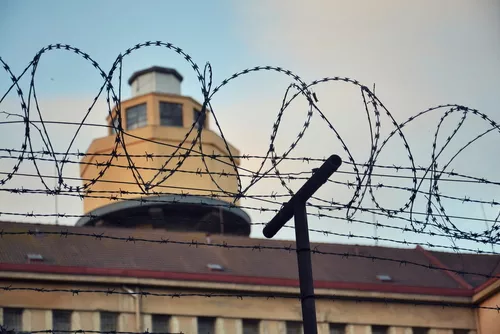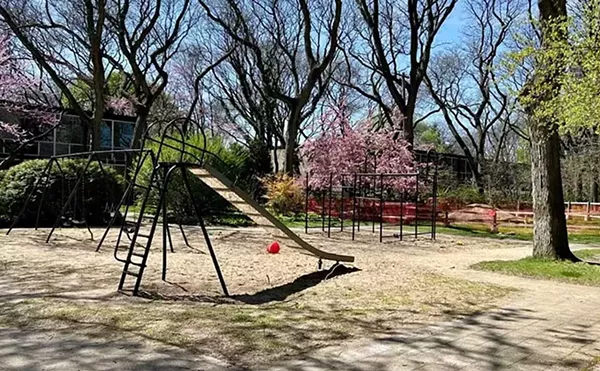
Audio By Carbonatix
[
{
"name": "GPT - Leaderboard - Inline - Content",
"component": "35519556",
"insertPoint": "5th",
"startingPoint": "3",
"requiredCountToDisplay": "3",
"maxInsertions": 100,
"adList": [
{
"adPreset": "LeaderboardInline"
}
]
}
]

Approximately 400 prisoners at Kinross Correctional Facility in the Upper Peninsula participated in a nationwide protest of inhumane treatment at correctional facilities. On Sept. 9, the prisoners at Kinross didn't report for work, and instead marched peacefully in the yard.
Their stated intention was to negotiate for better living and working conditions, including better quality and quantity of food, higher wages, lower phone rates, and to disallow putting up to eight men in a room designed for four.
The protest was peaceful, and organizers asked that the response from officials be in accordance with that, without violent retaliation.
Evelyn Williams, a family member of a prisoner at Kinross, said of the facility, "It's a very racist facility, where they intimidate and harass prisoners on a daily basis. The men just wanted the broken policies to be fixed. They're treated like animals, with no respect and no justice. They can't even afford to buy soap on their wages."
According to prisoner reports, the deputy wardens met the prisoners in the yard and agreed to address the grievances or communicate them to the legislature if necessary. Satisfied that they had come to an agreement, the prisoners began to disperse. Things took a turn for the worse, however, as soon as the deputy wardens left.
The prisoners claim that a tactical team stormed the yard with guns, rifles, tear gas, and shields. The armed officers then allegedly grabbed the men they suspected were the protest’s organizers, handcuffed their arms behind their backs with zip ties, and threw them to the ground. The bound men were left for five to six hours in the rain, and were not permitted to use restrooms during that time, forcing some to soil themselves.
No prisoners or staff were injured in the protest, said Michigan Department of Corrections spokesman Chris Gautz, and it began at about 8:50 a.m. on Sept. 9 and ended at about 12:30 p.m.
As prisoners who led the protest were removed, some damaged their housing units, Gautz said.
Historian Heather Ann Thompson of the University of Michigan wrote on The Daily Beast that she received detailed accounts from several prisoners who were at Kinross at the time.
One prisoner, according to Thompson, wrote: “At 9:30 p.m. SWAT entered my housing facility took control, ordered everyone on our bunks. Every single person complied. At 10 p.m., after a half hour of compliance and silence, they deployed pepper spray and tear gas in that unit without provocation. I don’t understand why they’d use it a half hour after they had full compliance and control.”
Thompson wrote that a second prisoner said riot squads deployed pepper spray and tear gas at prisoners in housing units, and "then they took their stand with their shields and all."
Duncan Tarr, a spokesperson for the group Michigan Prison Abolition, contends that the prison authorities dismissed the concerns the prisoners raised in their protest, and have responded with repressive repercussions.
“They’ve transferred more than 250 prisoners from Kinross to different facilities all over the state, upped security clearances ... and prisoners have been charged with inciting a riot," Tarr says. "Most of the action that’s been happening has been about how brutally the state has treated the prisoners.”
On Sept. 27, Dustin Allen Szot, 24, died at the Bellamy Creek Correctional Facility in Ionia, after being tasered repeatedly for fighting with another inmate. In an interview with WZZM-TV of Grand Rapids, his family members say that they were contacted by a prisoner who witnessed what had happened. He claimed that Szot was in a surrender position on his stomach and was tasered because an officer didn’t like something he said. “I guess my brother made a comment to one of the officers and the officer shot him with a taser gun,” said the inmate’s brother, Fred Szot. “They shot him again with another taser gun and the inmate that called me said three officers jumped on top of him and shot my brother in the back of the neck with a taser anywhere from four to six times. My brother’s body went limp.”
His family is calling for video and audio from the Michigan Department of Corrections, to get to the bottom of what truly happened, but they say they've had no success.
Why should we be concerned about prisoner’s rights? Tarr says: “There are a lot of different ways to think about this. At one level, you have to think about what if your loved one committed a crime according to the law and got sent to prison for two to 50 years? You would want that person to be treated like a human being and not an animal, at the very least. And I think people don’t think of prisoners as humans, as family members, fiances, as parents. And those people, prisoner's family members, deserve that respect too. I also think that as a society we should care about how we treat these people because they are allegedly in prison on our behalf. They are put behind bars, in cages with up to seven other people, so that these ‘streets can be safe.’ So if they’re treated brutally, it’s also on our behalf, in our name.”
The United States has more than 2 million people in prison, and that number is growing again. But some cracks are appearing in the carceral state, including exposes on substandard contractors, overbilling, and deplorable food, and the Department of Justice deciding against using for-profit prison contractors. Michigan Prison Abolition has stepped up its advocacy recently, coming up with innovative ways to help reform correctional facilities. They hold public events to educate people about how prisoners are being treated and to let prisoners know they are being fought for. They also have been doing "phone zaps," since Kinross, where they call prisons in the state that the alleged instigators were transferred to and talk to the wardens, telling them charges should be dropped and that prisoners should be taken out of solitary confinement. Tarr says the group is always thinking of new strategies and ways to put pressure on the state until prisoners are given basic human rights.
Michigan Prison Abolition has a few online presences, including their facebook page, No New Jails, No Old Jails, and facebook page Interrupt. They can also be contacted by email at miprisonabolition@gmail.com.





